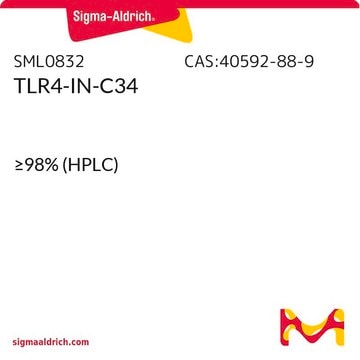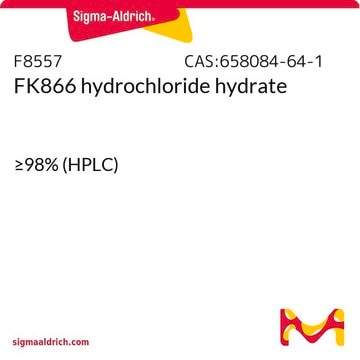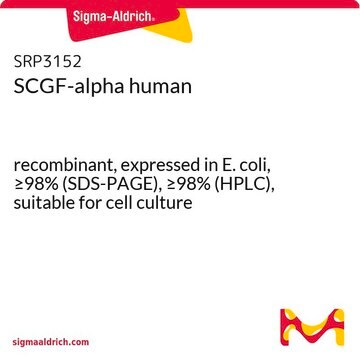SML3817
TLR2-IN-C29
≥98% (HPLC)
Synonym(s):
3-[[(2-Hydroxy-3-methoxyphenyl)methylene]amino]-2-methylbenzoic acid, C29
Sign Into View Organizational & Contract Pricing
All Photos(2)
About This Item
Empirical Formula (Hill Notation):
C16H15NO4
CAS Number:
Molecular Weight:
285.29
UNSPSC Code:
51111800
UNSPSC Code:
12352200
NACRES:
NA.21
Recommended Products
Quality Level
Assay
≥98% (HPLC)
form
powder
color
yellow to orange
solubility
DMSO: 2 mg/mL, clear
storage temp.
-10 to -25°C
SMILES string
O=C(C1=C(C)C(N=CC2=C(O)C(OC)=CC=C2)=CC=C1)O
Biochem/physiol Actions
TLR2-IN-C29 is a toll/IL-1 receptor resistance (TIR) domain BB loop-targeting, selective toll-like receptor 2 (TLR2) antagonist that inhibits both human TLR2/1 and TLR2/6-mediated signaling (IC50 = 37.6/19.7 μM against 50 ng/mL Pam3CSK/Pam2CSK-induced reporter signal, respectively, using HEK293T TLR2/6 or TLR2/1 transfectants), while blocking only murine TLR2/1-, but not murine TLR2/6-, mediated signaling (1h 25-50 μM C29 treatment prior to 50 ng P3C/mL or 100 ng P2C/mL for 1h in murine macrophages), nor signaling induced by other TLR agonists and TNF-α.
Storage Class Code
11 - Combustible Solids
WGK
WGK 3
Flash Point(F)
Not applicable
Flash Point(C)
Not applicable
Certificates of Analysis (COA)
Search for Certificates of Analysis (COA) by entering the products Lot/Batch Number. Lot and Batch Numbers can be found on a product’s label following the words ‘Lot’ or ‘Batch’.
Already Own This Product?
Find documentation for the products that you have recently purchased in the Document Library.
Inhibition of TLR2 signaling by small molecule inhibitors targeting a pocket within the TLR2 TIR domain
Proceedings of the National Academy of Sciences of the USA, 112(17), 5455-5460 (2015)
Jingjing Lu et al.
Frontiers in pharmacology, 13, 838873-838873 (2022-04-05)
Tetrastigma hemsleyanum Diels et Gilg (Sanyeqing, SYQ) has traditionally been used to treat inflammation, high fever and improve immune function of patients. Polysaccharides have been proved to be one of the important components of SYQ. Previous studies have confirmed the
Maria Grabowski et al.
Biochemical pharmacology, 171, 113687-113687 (2019-11-05)
Toll-like receptor 2 (TLR2) forms heterodimers with either TLR1 or TLR6 to induce protective early inflammatory responses to pathogen- and damage-associated molecular patterns. However, excessive activation is associated with inflammatory and metabolic diseases. Several TLR2 antagonists have been described but
Our team of scientists has experience in all areas of research including Life Science, Material Science, Chemical Synthesis, Chromatography, Analytical and many others.
Contact Technical Service








